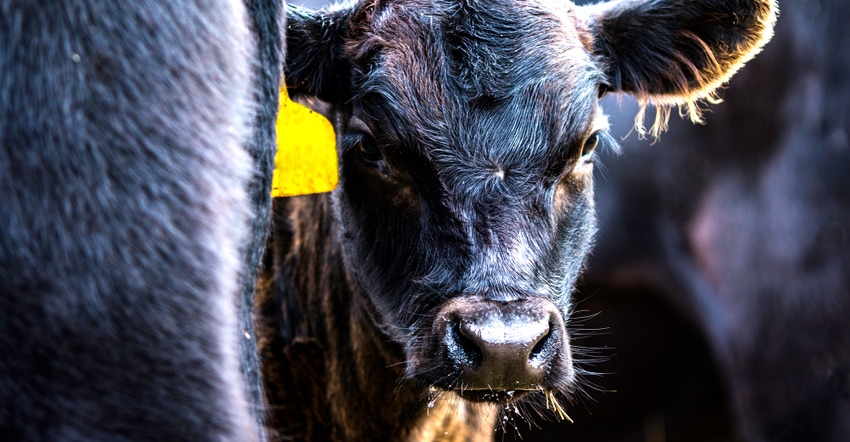
The Beef Improvement Federation has been connecting science and the beef industry since 1968 in a singular goal to improve beef cattle genetics across breeds. Cattle producers, Extension specialists and researchers work together to improve the profitability and sustainability of beef production.
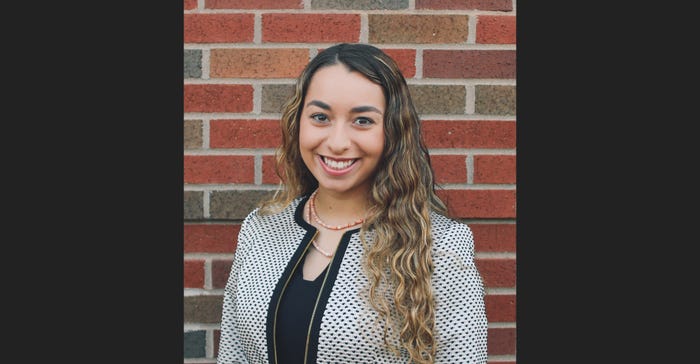 UNDERGRADUATE WALLACE SCHOLAR: Eva Hinrichsen, Westmoreland, Kan., received the $1,250 2021 Roy A. Wallace Memorial Scholarship for Undergraduates, presented by the Beef Improvement Federation. Hinrichsen studies animal science at Oklahoma State University. She was the 2020 Miss American Angus and was selected as one of OSU’s Top 20 Freshman Women. She plans to participate on the OSU livestock judging team. “After obtaining my bachelor’s degree, I would like to continue on to graduate school to pursue a master’s degree in ruminant nutrition and livestock reproduction, and then acquire my doctorate degree to teach at a land-grant university,” she says. Hinrichsen also plans to stay involved in her family’s cattle operation and grow her own herd of registered Angus cattle. (Courtesy of Beef Improvement Federation)
UNDERGRADUATE WALLACE SCHOLAR: Eva Hinrichsen, Westmoreland, Kan., received the $1,250 2021 Roy A. Wallace Memorial Scholarship for Undergraduates, presented by the Beef Improvement Federation. Hinrichsen studies animal science at Oklahoma State University. She was the 2020 Miss American Angus and was selected as one of OSU’s Top 20 Freshman Women. She plans to participate on the OSU livestock judging team. “After obtaining my bachelor’s degree, I would like to continue on to graduate school to pursue a master’s degree in ruminant nutrition and livestock reproduction, and then acquire my doctorate degree to teach at a land-grant university,” she says. Hinrichsen also plans to stay involved in her family’s cattle operation and grow her own herd of registered Angus cattle. (Courtesy of Beef Improvement Federation)

Every year, BIF recognizes outstanding cattle producers and industry participants who further that goal. This year’s recipients included industry luminaries as well as the next generation, who will continue the work to improve beef cattle genetics. Two Kansas families were also honored for their work with both seedstock and commercial cattle herds.
Seedstock Producer of the Year
The Brunner family of Cow Camp Ranch, Lost Springs, Kan., received the 2021 BIF Seedstock Producer of the Year award for dedication to improving the beef industry at the seedstock level. Kansas Livestock Association nominated the family.
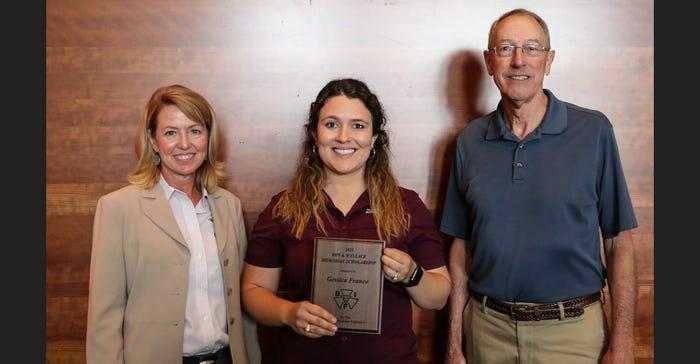 GRADUATE WALLACE SCHOLAR: Gessica Franco (center), College Station, Texas, received the $1,250 2021 Roy A. Wallace Memorial Scholarship for Graduate Students from Lorna Marshall and Norm Vincell of Select Sires Inc. Franco is working on her doctorate in the physiology of reproduction at Texas A&M University. She works with Ky Pohler, an assistant professor in physiology of reproduction, researching the traditional view of male effect on pregnancy outcomes in cattle and the significant impact it has on improving the sire fertility evaluation system. The Wallace Scholarships were established by Select Sires to honor the life and career of Roy Wallace, who worked for Select Sires for 40 years, devoting his life to the improvement of beef cattle. (Courtesy of Beef Improvement Federation)
GRADUATE WALLACE SCHOLAR: Gessica Franco (center), College Station, Texas, received the $1,250 2021 Roy A. Wallace Memorial Scholarship for Graduate Students from Lorna Marshall and Norm Vincell of Select Sires Inc. Franco is working on her doctorate in the physiology of reproduction at Texas A&M University. She works with Ky Pohler, an assistant professor in physiology of reproduction, researching the traditional view of male effect on pregnancy outcomes in cattle and the significant impact it has on improving the sire fertility evaluation system. The Wallace Scholarships were established by Select Sires to honor the life and career of Roy Wallace, who worked for Select Sires for 40 years, devoting his life to the improvement of beef cattle. (Courtesy of Beef Improvement Federation)

The Brunner family has been farming and ranching since the early 1890s on the western edge of the Flint Hills, just off the old Santa Fe Trail. The fifth generation of Brunners is raising cattle on the same land that was originally settled.
The registered Simmental cow herd was founded in 1969 by Kent Brunner, using some of the original Simmental genetics imported into the United States. Cow Camp Ranch was one of the earliest members of the American Simmental Association.
Today Kent and his son Nolan manage the 800 head of registered Simmental, Sim-Angus, and Angus cows on native Flint Hills grass year-round. Crossbreeding maximizes the genetic potential of both the Simmental and Angus breeds, using both embryo transfer and artificial insemination. Each spring the Brunners market about 250 head of bulls and a select group of females in their annual bull sale, held the first Friday in February.
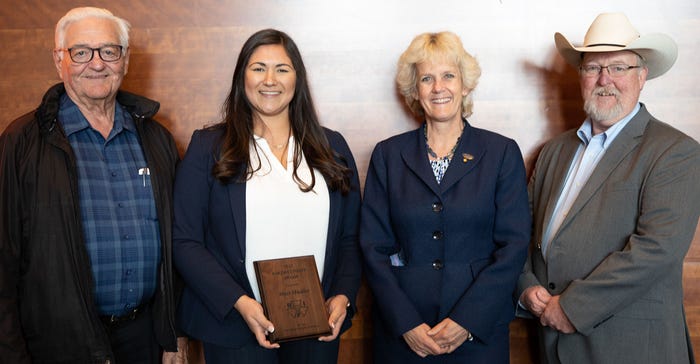 BAKER/CUNDIFF AWARD: Mai Mueller (second from left), Davis, Calif., received the $1,000, 2021 Frank Baker/Larry Cundiff Beef Improvement Essay Contest award for graduate students from Larry Cundiff (left); Alison Van Eenennaam, Extension specialist in animal biotechnology and genomics, University of California, Davis; and Robert Williams, American Wagyu Association executive director and BIF board historian. The award honors outstanding student research and competitive writing. Mueller, from Princeton, Neb., is working on her doctorate at UC Davis. Her essay, “Gene Editing as a Tool for Genetic Improvement of Beef Cattle” is posted to the BIF website, bifsymposium.com. Baker played a key leadership role in establishing the BIF in 1968 while chairman of the Department of Animal Science at the University of Nebraska-Lincoln. Cundiff spent a 40-year career as a research geneticist with the USDA Agricultural Research Service, leading the genetics and breeding research unit at the U.S. Meat Animal Research Center until 2005. (Courtesy of Beef Improvement Federation)
BAKER/CUNDIFF AWARD: Mai Mueller (second from left), Davis, Calif., received the $1,000, 2021 Frank Baker/Larry Cundiff Beef Improvement Essay Contest award for graduate students from Larry Cundiff (left); Alison Van Eenennaam, Extension specialist in animal biotechnology and genomics, University of California, Davis; and Robert Williams, American Wagyu Association executive director and BIF board historian. The award honors outstanding student research and competitive writing. Mueller, from Princeton, Neb., is working on her doctorate at UC Davis. Her essay, “Gene Editing as a Tool for Genetic Improvement of Beef Cattle” is posted to the BIF website, bifsymposium.com. Baker played a key leadership role in establishing the BIF in 1968 while chairman of the Department of Animal Science at the University of Nebraska-Lincoln. Cundiff spent a 40-year career as a research geneticist with the USDA Agricultural Research Service, leading the genetics and breeding research unit at the U.S. Meat Animal Research Center until 2005. (Courtesy of Beef Improvement Federation)

The family also owns and operates a 9,000-head commercial feedyard managed by Kent’s brothers, Mark and Tracy Brunner. The Brunners also own several thousand acres in native grass, hay and crop production.
Commercial Producer of the Year
The Weltmer family of W&S Ranch Inc., Smith Center, Kan., were recognized for their dedication to improving the beef industry at the commercial level.
The W&S Ranch was started by Richard Weltmer and his wife, Avis (Sprague), when Richard came back from serving in the Korean War. In 1977, their two sons, Kenton and Mike, returned to the ranch, and by 1978 the operation transitioned into W&S Ranch Inc. In 2003, grandson Philip and his wife, Jessica, returned to the ranch.
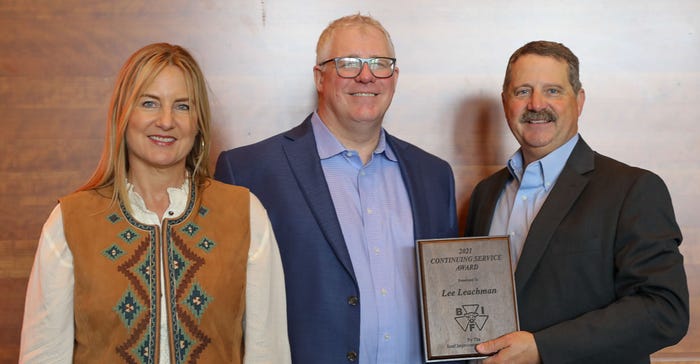 TRAILBLAZER: The Beef Improvement Federation presented a 2021 Continuing Service Award to Lee Leachman (center), Fort Collins, Colo., for his trailblazing work in using advanced technologies to improve beef cattle genetics. Leachman is the managing partner of Leachman Cattle of Colorado, based in Fort Collins, and he served as the 2018-19 BIF president. Each year Leachman sells more than 2,500 bulls, working with a network of more than 40 cooperating herds. As a result of his life’s work to improve feed efficiency, quality, productivity and carcass value in his cattle, he started $Profit, a private genetic evaluation that calculates and provides EPDs and selection indexes on more than 1.5 million cattle in its database. Leachman and his wife, Lisa, accepted the award from Donnell Brown, Throckmorton, Texas, at the 53 Annual Symposium and Convention in Des Moines, Iowa, June 23. (Courtesy of Beef Improvement Federation)
TRAILBLAZER: The Beef Improvement Federation presented a 2021 Continuing Service Award to Lee Leachman (center), Fort Collins, Colo., for his trailblazing work in using advanced technologies to improve beef cattle genetics. Leachman is the managing partner of Leachman Cattle of Colorado, based in Fort Collins, and he served as the 2018-19 BIF president. Each year Leachman sells more than 2,500 bulls, working with a network of more than 40 cooperating herds. As a result of his life’s work to improve feed efficiency, quality, productivity and carcass value in his cattle, he started $Profit, a private genetic evaluation that calculates and provides EPDs and selection indexes on more than 1.5 million cattle in its database. Leachman and his wife, Lisa, accepted the award from Donnell Brown, Throckmorton, Texas, at the 53 Annual Symposium and Convention in Des Moines, Iowa, June 23. (Courtesy of Beef Improvement Federation)

W&S Ranch runs both a commercial cow herd and a registered Angus herd. Their 180 cows are all bred through artificial insemination using Angus or Sim-Angus genetics, and are followed with Angus cleanup bulls raised by the Weltmers. Cows calve between Jan. 20 and March 1, resulting in a tight calving window that allows a very uniform cohort of calves to be finished in the family’s feedyard. They are processed at 13-and-a-half months of age.
Cows rotationally graze on native and summer grasses from April 15 to Oct. 1, and then are placed on cornstalks. During calving season, they have supplemental feed from mid-January until breeding. W&S Ranch emphasizes improved genetics and profit-proven outcomes. The Kansas Livestock Association nominated the Weltmers because of their openness to change, and how every segment of the business is continuously under evaluation to improve efficiency and effectiveness.
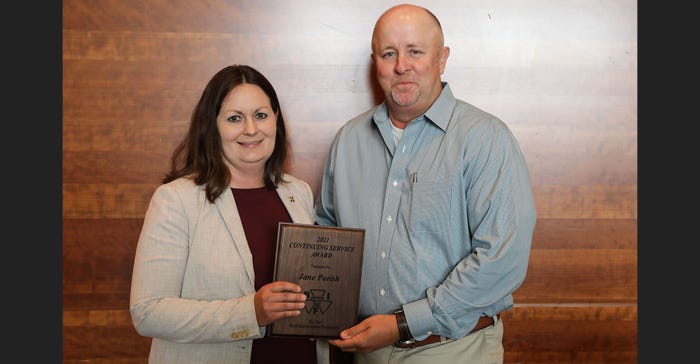 APPLIED RESEARCH: The Beef Improvement Federation presented a 2021 Continuing Service Award to Jane Parish, Verona, Miss., for her service as BIF executive director. Parish is the department head for the North Mississippi Research and Extension Center in Verona and the interim head for the Mississippi State University Department of Animal and Dairy Sciences. Applied research is the heart and soul of Parish’s career as a professor and Extension professional at MSU. She’s written countless research papers on reproduction, genetics, cattle management, forage utilization and more. And she’s led the way in promoting and administering successful Extension programming. Parish accepted the award from Former BIF President Marty Ropp. (Courtesy of Beef Improvement Federation)
APPLIED RESEARCH: The Beef Improvement Federation presented a 2021 Continuing Service Award to Jane Parish, Verona, Miss., for her service as BIF executive director. Parish is the department head for the North Mississippi Research and Extension Center in Verona and the interim head for the Mississippi State University Department of Animal and Dairy Sciences. Applied research is the heart and soul of Parish’s career as a professor and Extension professional at MSU. She’s written countless research papers on reproduction, genetics, cattle management, forage utilization and more. And she’s led the way in promoting and administering successful Extension programming. Parish accepted the award from Former BIF President Marty Ropp. (Courtesy of Beef Improvement Federation)

Both families were recognized at the BIF 53rd Annual Research Symposium and Convention, held in person in Des Moines, Iowa, June 24.
The Beef Improvement Federation contributed to this article.
About the Author(s)
You May Also Like






